- Home
- War in the Middle East
- UN Aid Chief Warns of Apocalyptic Outcome to Gaza Conflict

©KARIM JAAFAR / AFP
The stranglehold on aid reaching Gaza threatens an "apocalyptic" outcome, the UN's humanitarian chief Martin Griffiths said on Sunday as he warned of famine in the besieged territory.
"If fuel runs out, aid doesn't get to the people where they need it, that famine, which we have talked about for so long, and which is looming, will not be looming anymore. It will be present," Griffiths said.
"And I think our worry, as citizens of the international community, is that the consequence is going to be really, really hard. Hard, difficult, and apocalyptic," he told AFP on the sidelines of meetings with Qatari officials in Doha.
Griffith, the UN's Under-Secretary-General for Humanitarian Affairs and Emergency Relief Coordinator, said some 50 trucks of aid per day could reach the hardest-hit north of Gaza through the reopened Erez crossing.
But battles near the Rafah and Kerem Shalom crossings in Gaza's south meant the vital routes were "effectively blocked", he explained.
"So aid getting in through land routes to the south and for Rafah, and the people dislodged by Rafah is almost nil," Griffiths added.
Griffiths said the military action in the southern Gazan city was "exactly what we feared it would be."
"And we all said that very clearly, that a Rafah operation is a disaster in humanitarian terms, a disaster for the people already displaced to Rafah. This is now their fourth or fifth displacement," he said.
Some relief supplies began flowing in via a temporary, floating pier constructed by the United States.
Griffiths said the maritime operation was "beginning to bring in some truck loads of aid" but he cautioned "it's not a replacement for the land routes."
On Thursday, the Arab League called for a UN peacekeeping force to be deployed in the Palestinian territories and for an international conference to resolve the Palestinian issue on the basis of the two-state solution.
Griffiths explained there were a "number of different conferences being potentially planned" to discuss humanitarian arrangements in Gaza.
"I feel very strongly that the United Nations needs to be present at the table when all these things are being discussed," the UN aid chief said.
But he cautioned on the likelihood of a UN peacekeeping force for the Palestinian territories. A proposed deployment could be blocked by a veto from permanent Security Council members, while it would also require the acceptance from the warring parties.
The UN announced in March that Griffiths, a British barrister, would step down in June over health concerns.
Callum Paton, with AFP
"If fuel runs out, aid doesn't get to the people where they need it, that famine, which we have talked about for so long, and which is looming, will not be looming anymore. It will be present," Griffiths said.
"And I think our worry, as citizens of the international community, is that the consequence is going to be really, really hard. Hard, difficult, and apocalyptic," he told AFP on the sidelines of meetings with Qatari officials in Doha.
Griffith, the UN's Under-Secretary-General for Humanitarian Affairs and Emergency Relief Coordinator, said some 50 trucks of aid per day could reach the hardest-hit north of Gaza through the reopened Erez crossing.
But battles near the Rafah and Kerem Shalom crossings in Gaza's south meant the vital routes were "effectively blocked", he explained.
"So aid getting in through land routes to the south and for Rafah, and the people dislodged by Rafah is almost nil," Griffiths added.
Griffiths said the military action in the southern Gazan city was "exactly what we feared it would be."
"And we all said that very clearly, that a Rafah operation is a disaster in humanitarian terms, a disaster for the people already displaced to Rafah. This is now their fourth or fifth displacement," he said.
Some relief supplies began flowing in via a temporary, floating pier constructed by the United States.
Griffiths said the maritime operation was "beginning to bring in some truck loads of aid" but he cautioned "it's not a replacement for the land routes."
On Thursday, the Arab League called for a UN peacekeeping force to be deployed in the Palestinian territories and for an international conference to resolve the Palestinian issue on the basis of the two-state solution.
Griffiths explained there were a "number of different conferences being potentially planned" to discuss humanitarian arrangements in Gaza.
"I feel very strongly that the United Nations needs to be present at the table when all these things are being discussed," the UN aid chief said.
But he cautioned on the likelihood of a UN peacekeeping force for the Palestinian territories. A proposed deployment could be blocked by a veto from permanent Security Council members, while it would also require the acceptance from the warring parties.
The UN announced in March that Griffiths, a British barrister, would step down in June over health concerns.
Callum Paton, with AFP
Read more



Comments